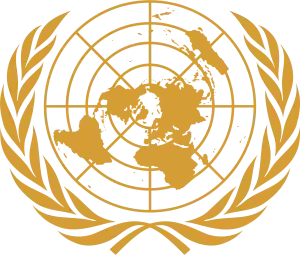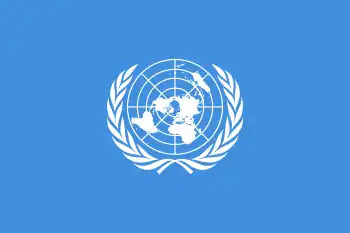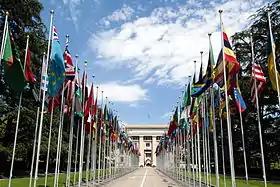Under-Secretary-General of the United Nations
An Under-Secretary-General of the United Nations (USG) is a senior official within the United Nations System, normally appointed by the General Assembly on the recommendation of the Secretary-General for a renewable term of four years. Under-Secretary-General is the third highest rank in the United Nations, after the Secretary-General and the Deputy Secretary-General. The rank is held by the heads of different UN entities, certain high officials of the United Nations Secretariat, and high-level envoys. The United Nations regards the rank as equal to that of a cabinet minister of a member state, and under-secretaries-general have diplomatic immunity under the UN Charter.
| Under Secretary-General of the United Nations | |
|---|---|
 | |
 | |
 | |
| Style | His Excellency |
| Constituting instrument | United Nations Charter |
| Website | un.org/ |
Appointment and accountability
The majority of USGs are appointed by the UN General Assembly on the recommendation of the Secretary-General for a fixed term of four years. Others (normally special envoys, Secretariat-appointees and non-programme management positions) are appointed directly by the UN Secretary-General on his own authority. However, all USGs report to the UN General Assembly through the UN Secretary-General. The only exception to this is the Under-Secretary-General for Internal Oversight Services who reports directly to the General Assembly.
The distinction in method of appointment is important as USGs appointed by the General Assembly have a mandate independent of the Secretary-General, and he is therefore unable to remove them from office without the General Assembly's consent. This restriction has been seen by many commentators to weaken the Secretary-General's ability to provide strong leadership and management within the United Nations System.
Equivalent rank
Some senior posts within the UN System have the equivalent rank of Under-Secretary-General but are either not entitled or choose not to use the formal title. The most prominent example of this is the Administrator of the United Nations Development Programme, who is often referred to as the third most senior official within the UN System yet does not use the title of Under-Secretary-General.
Diplomatic rank
USGs have diplomatic rank equivalent to that of a national cabinet minister. Under Article 105 of the United Nations Charter they have diplomatic immunity.
Senior Management Group (SMG)
With over 50 people with the rank of Under-Secretary-General, unsurprisingly the influence and power they wield within the UN System varies dramatically. The most important USGs, controlling budgets, programmes or key activities, are also members of the United Nations Senior Management Group, whose objective is to ensure strategic coherence and direction in the work of the Organization. The cabinet was approved by the General Assembly in 1997 as part of the reform proposal submitted by Secretary-General Kofi Annan.
List of Under-Secretaries-General
The following is a list of Under-Secretaries-General or those with equivalent rank. This list is not exhaustive. Members of the SMG are indicated by an asterisk (*).
Programmes and commissions
- Michelle Bachelet * - High Commissioner, United Nations Office of the High Commissioner for Human Rights (OHCHR)
- Grete Faremo - Executive Director of United Nations Office for Project Services (UNOPS)
- Ghada Waly * - Director-General, United Nations Office at Vienna and Chief Executive, United Nations Office on Drugs and Crime (UNODC)
- Phumzile Mlambo-Ngcuka* - Under-Secretary-General, Executive Director of the United Nations Entity for Gender Equality and the Empowerment of Women, (UN Women)
- Winnie Byanyima - Executive Director, Joint United Nations Programme on HIV/AIDS (UNAIDS)
- Houlin Zhao - Secretary-General International Telecommunication Union
- Chaesub Lee - Director ITU-T
- Mukhisa Kituyi * - United Nations Conference on Trade and Development (UNCTAD)
- Tegegnework Gettu - Associate Administrator, United Nations Development Programme (UNDP)
- Achim Steiner * - Administrator, United Nations Development Programme (UNDP), also chair of the United Nations Development Group
- Vera Songwe * - Executive Secretary, United Nations Economic Commission for Africa (UNECA)
- Olga Algayerova * - United Nations Economic Commission for Europe (UNECE)
- Alicia Bárcena * - United Nations Economic Commission for Latin America and the Caribbean (UNECLAC)
- Rima Khalaf * - United Nations Economic and Social Commission for Western Asia (UNESCWA)[1]
- Armida Alisjahbana * - United Nations Economic and Social Commission for Asia and the Pacific (UNESCAP)[2]
- Natalia Kanem * - Executive Director, United Nations Population Fund (UNFPA)
- Inger Andersen * - Executive Director, United Nations Environment Programme (UNEP)
- Maimunah Mohd Sharif * - Executive Director, United Nations Human Settlements Programme (UN-HABITAT)[3]
- Filippo Grandi * - United Nations High Commissioner for Refugees (UNHCR)
- Henrietta H. Fore * - United Nations Children's Fund (UNICEF)
- David M. Malone * - Rector, United Nations University (UNU)
- David Beasley * - World Food Programme (WFP)
Secretariat officials
- Fekitamoeloa ‘Utoikamanu - High Representative for LDCs, LLDCs and SIDS
- Pramila Patten * - Under-Secretary-General and Special Representative of the Secretary-General on Sexual Violence in Conflict[4]
- Peter Thomas Drennan * - Under-Secretary-General for Safety and Security
- Rosemary DiCarlo * - Under-Secretary-General for Political Affairs
- Atul Khare - Under-Secretary-General for Department of Operational Support
- Izumi Nakamitsu * - Under-Secretary-General, High Representative for Disarmament Affairs
- Jean-Pierre Lacroix * - Under-Secretary-General for Peacekeeping Operations
- Alison Smale* - Under-Secretary-General for Public Information
- Mark Lowcock * - Under-Secretary-General and Humanitarian Affairs Emergency Relief Coordinator
- Augustine P. Mahiga* - Under-Secretary-General, Mediator-in-Residence, DPA’s Mediator Debriefing and Lessons Learned Programme
- Maria Luiza Ribeiro Viotti * - Under-Secretary-General, Chef de Cabinet
- Heidi Mendoza * - Under-Secretary-General for Internal Oversight Services
- Tatiana Valovaya * - Director-General of the United Nations Office at Geneva
- Catherine Pollard * - Under-Secretary-General Department of Management Strategy, Policy and Compliance
- Movses Abelian * - Under-Secretary-General Department for General Assembly and Conference Management
- Melissa Fleming * - Under-Secretary-General for Global Communications
- Carlos Gabriel Ruiz Massieu Aguirre - Chairman of the Advisory Committee on Administrative and Budgetary Questions
- Miguel de Serpa Soares * - Under-Secretary-General and Legal Counsel
- Liu Zhenmin * - Under-Secretary-General for Economic and Social Affairs
- Leila Zerrougui - Special Representative for Children and Armed Conflict
- Zainab Hawa Bangura - Director-General of the United Nations Office at Nairobi
Advisers
- Bience Gawanas* - Under-Secretary-General, Special Adviser on Africa
- Adama Dieng* - Under-Secretary-General Special Adviser to the Secretary-General on the Prevention of Genocide
- Philippe Douste-Blazy - Special Adviser to the Secretary-General on Innovative Financing for Development
- Paul Farmer* - Special Adviser to the Secretary-General for community-based medicine and lessons from Haiti
- Kim Won-soo - Under-Secretary-General, Special Adviser to the Secretary-General
- Nicolas Michel* - Special Adviser to the Secretary-General and Mediator in the border dispute between Equatorial Guinea and Gabon
- Joseph Verner Reed, Jr. - Special Adviser to the Secretary-General
- Iqbal Riza* - Under-Secretary-General, Special Adviser to the Secretary-General
- Jeffrey Sachs - Senior Adviser to the Secretary-General on the Millennium Development Goals (2004-2006), Director of the United Nations Millennium Project
- Espen Barth Eide* Special Adviser to the Secretary-General on Cyprus (2014-2017)
- Vijay Nambiar * - Special Adviser to the Secretary-General (2012-2016)
- Wilfried Lemke - Special Adviser to the Secretary-General on Sport for Development and Peace (2008-2016)
Special envoys
- Gordon Brown* - Special Envoy for Global Education
- Ray Chambers* - Special Envoy for Malaria
- Michel Kazatchkine* - Special Envoy for HIV/AIDS in Eastern Europe and Central Asia
- Nicholas Haysom* - Under-Secretary-General, Special Envoy of the Secretary-General for Sudan and South Sudan
- Hanna Tetteh* - Under-Secretary-General, Head of United Nations Office to the African Union
- Matthew Nimetz* - Under-Secretary-General, Personal Envoy of the Secretary-General for the Greece-FYROM Talks
- J.V. Prasada Rao* - Special Envoy for AIDS in Asia & Pacific
- Mary Robinson - Special Envoy on Climate Change
- Terje Rød-Larsen* - Special Envoy of the Secretary-General for the implementation of Security Council resolution 1559/2004
- Jacques Rogge* - Special Envoy of the Secretary-General for Youth Refugees and Sport
- Christopher Ross* - Personal Envoy of the Secretary-General for Western Sahara
- Hiroute Guebre Sellassie* - Special Envoy of the Secretary-General for the Sahel
- Martin Griffiths - Special Envoy of the Secretary-General for Yemen
- Mirko Manzoni - Under-Secretary-General, Personal Envoy of the Secretary-General for Mozambique
- Christine Schraner Burgener- Special Envoy of the Secretary-General for Myanmar
Other senior UN positions
Deputy Secretary-General
The Deputy Secretary-General is the second highest-ranking official in the UN System after the Secretary-General. Amina Mohammed is the current office holder.
Assistant Secretary-General
An Assistant Secretary-General sits beneath an Under-Secretary-General within the UN hierarchy. Assistant Secretaries-General are often deputies within Departments or Programmes, reporting to their respective Under-Secretary-General and through him/her to the UN Secretary-General.
References
- "Office of the Executive Secretary". United Nations Economic and Social Commission for Western Asia — ESCWA. Archived from the original on July 28, 2011. Retrieved September 10, 2011.
- "Biography of Executive Secretary Shamshad Akhtar - United Nations ESCAP". www.unescap.org. Retrieved 2 April 2018.
- https://unhabitat.org/our-secretariat/our-executive-director/
- "Stop Rape Now - Features". Retrieved January 23, 2018.